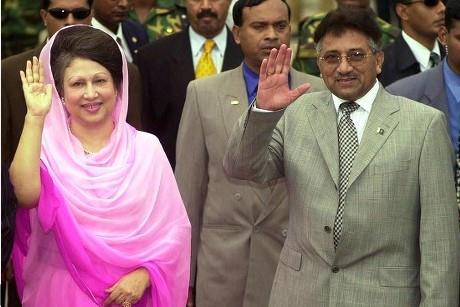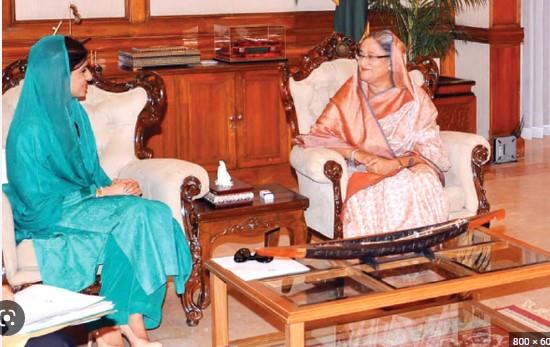(MENAFN- NewsIn.Asia)
By P.K.Balachandran/Ceylon Today
Colombo, February 20: On the sidelines of Sri Lanka's 74 th. Independence Day celebrations in Colombo earlier this month, Pakistan's State Minister of Foreign Affairs, Hina Rabbani Khar, sought a bilateral meeting with the Bangladesh Foreign Minister A.K. Abdul Momen. As per established practice, the request was granted.
While the media readout on the discussions merely said that the two leaders discussed ways to improve ties, the Indian news agency ANI reported that Momen reiterated his government's consistent position that normalization could not take place until Pakistan officially and unconditionally apologized for the atrocities committed by its army in the months preceding Bangladesh's birth in December 1971. Though the number of civilians killed in the seven-month liberation war is disputed, it was humongous by all accounts.
ADVERTISEMENT
Pakistan's response to the demand for a formal apology, since it was first made during Prime Minister Sheikh Hasina's first term in 1996, has been that its leaders had more than once“regretted” the happenings. But in Bangladesh's view, these did not amount to an official apology or acceptance of guilt.
Against this, Pakistan's view has been that the two countries should not be prisoners of the past. But this does not cut ice with Bangladesh Prime Minister Sheikh Hasina and the pro-liberation support base of her party, the Awami League (AL). The AL had spearheaded the liberation movement against Pakistan under the leadership of Sheikh Mujibur Rahman, Hasina's father.
However, it is not as if attempts have never been made for a rapprochement. But these efforts eventually failed. That was so even when the rulers in Dhaka were well- disposed towards Pakistan, like Gen. Ziaur Rahman, Gen.H. M. Ershad and Khaleda Zia. In fact, Sheikh Mujib himself had reached out to Pakistan in 1973-74, a couple of years before he was assassinated by pro-Pakistan junior army officers.

Musharraf with Khaleda Zia
The initial euphoria over the liberation of Bangladesh with the help of the Indian army wore out by 1973. Bangladesh was facing severe economic problems and Mujib's dictatorial rule. Mujib was getting unpopular. Thinking that his close links with liberator India had become a liability, he distanced himself from it, shed his government's secular claims, and asserted Bangladesh's Islamic identity. He joined the Organization of Islamic Cooperation (OIC) in February 1974 and in June 1974 got Pakistan Prime Minister Z.A. Bhutto to pay a state visit.
At the tripartite talks held between India, Pakistan and Bangladesh in April 1974 to end the 1971 conflict, Mujib did not raise the issue of an official apology from Pakistan, according to Moonis Ahmar, author of Pakistan-Bangladesh relations – Prospects and Way Forward. Ahmar notes that Mujib even granted amnesty to those who collaborated with the Pakistan Army.
After Mujib was assassinated by a group of pro-Pakistan army officers in August 1975, the successor regimes of Gen. Ziaur Rahman, Gen.H.M.Ershad and Khaleda Zia carried forward the policy of Islamization and mending ties with Pakistan. Ziaur Rahman journeyed to Pakistan and improved trade relations. In 1977, Pakistan was Bangladesh's second-largest trading partner after the US. Presidents Zia and Ershad and Prime Minister Khaleda Zia were using Pakistan as a bulwark against India. The trio had serious issues with India over river waters sharing, the definition of the border and the shelter given to anti-Indian terror groups in Bangladesh.
However, it did not take long for these regimes to become unpopular on grounds of non-performance and misrule. But their strategy of securing legitimacy by playing the Islamic and anti-Indian/pro-Pakistan cards failed. These neither delivered the goods domestically nor to a detente with Pakistan.
Even the pro-Pakistan Bangladesh regimes wanted the return of Bangladesh's assets in the possession of Pakistan (estimated at US$ 4.5 billion) and the repatriation of the 230,000 Biharis who had sided with the
Pakistani army during the liberation war. But Pakistan demanded that the pre-war liabilities be shared. These issues were raised by Khaleda when the Pakistani military ruler Gen.Pervez Musharraf visited Dhaka in 2002.
Though not in power, the pro-liberation and anti-Pakistan constituency in Bangladesh was substantial. It was revitalized when Mujib's doughty daughter, Sheikh Hasina, returned from exile in India in 1981. This was a watershed in the history of Bangladesh-Pakistan relations because when she came to power for the first time in 1996, she demanded an unconditional and official apology from Pakistan for the atrocities of 1971. In 2003 she executed Jamaat-e-Islami activists on charges of collaboration in Pakistan's war crimes in 1971. The Pakistani protest over the executions only widened the gap.
While Bangladesh is unquestionably an Islamic State, it is difficult for any Bangladeshi political party to rely only on the Islamic card to have any special ties with Islamic Pakistan. Other factors play and have played key roles in shaping bilateral relations. Since 2009, Bangladeshi parties other than the Awami League, have been existing only on the margins. Therefore, the Awami League's view of the liberation movement, the war and Pakistani war crimes, is the dominant narrative in Bangladesh.
Given the economic boom Bangladesh has been experiencing in the last decade, and its wide-ranging social achievements, Dhaka can now afford to be choosy in selecting its friends. Although Bangladesh's growth rate is expected to come down from 7% to 5.5% in 2023 and it has had to go for an IMF loan of US4 4.7 billion, the country has been doing better than Pakistan across the board..

Hina Rabbani Khar with Sheikh Hasina
Writing in Business Recorder in December 2022, Bilal Hussain quotes the World Bank to say that Bangladesh's GDP had increased from US$ 8.75 billion in 1971 to US$ 416 billion in 2021. On the other hand, Pakistan's GDP stood at US$ 346 billion in 2021 after being ahead with US$ 10.67 billion in 1971. Bangladesh's per capita income was US$ 2,503 – over 60% higher than Pakistan's US$ 1,538. Its foreign exchange reserves stood at US$ 30 billion - roughly four months of import cover. Pakistan's reserves stand at US$ 6.7 billion - less than 1.5 months of import cover, Hussain points out.
Life expectancy in Bangladesh is 73 years against Pakistan's 67. In Bangladesh, 96% of people have access to electricity while in Pakistan that number is 75%.
Pakistan cannot match India as a development partner for Bangladesh because India is also leapfrogging. Bangladesh and India are inter-twined in multifarious ways since Hasina came to power in 2009. While it cannot be denied that India and Bangladesh have issues between them such as river waters-sharing and slow execution of projects, and there is a vocal anti-Indian lobby in Bangladesh, Dhaka would rather have good relations with a growing India than abandon it for Pakistan which has little to offer.
India was Bangladesh's second-largest trade partner in 2022. Bilateral trade increased to US$ 18.2 billion in 2022 as against US$10.8 billion in 2021. In contrast, Pakistan's exports to Bangladesh were US$ 583.44 million in 2020 and its imports from Bangladesh were US 61.94 million in 2020.
While the Hasina regime will continue to insist on Pakistan's rendering an official apology for the events of 1971, Pakistan will not oblige. Any chance of an apology disappeared when the retiring Pakistani army chief Gen. Qamar Javed Bajwa told an invited audience in November 2022, that the army could not be blamed for the events of 1971 and that criticism of it had been“indecent” and“intolerable”. Given the dominant position of the army in Pakistan, its politicians dare not let it down by apologizing publicly.
END



















Comments
No comment